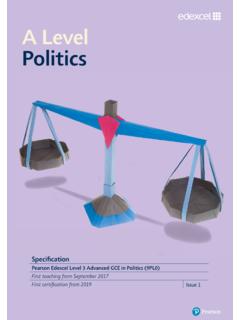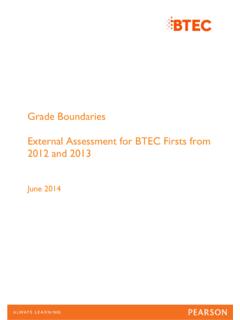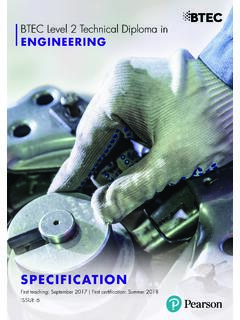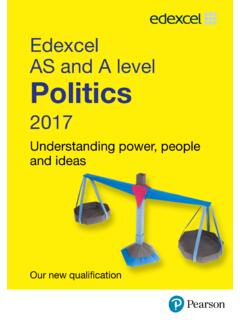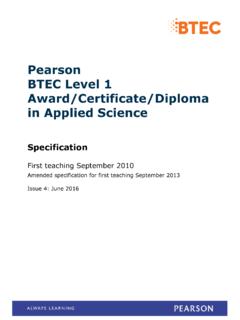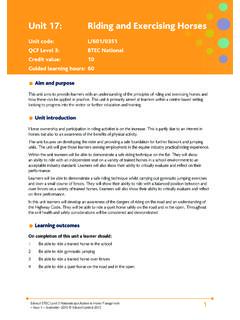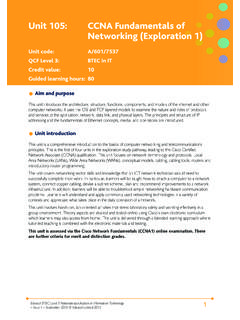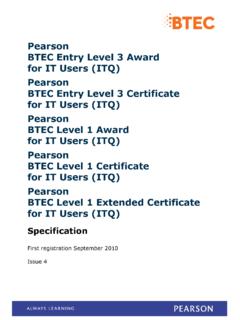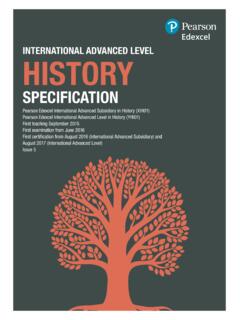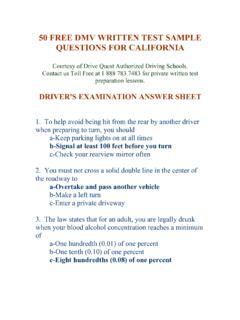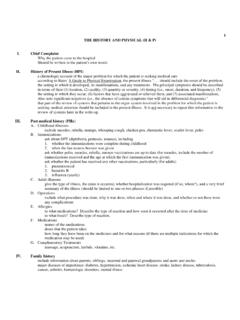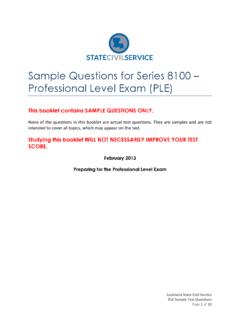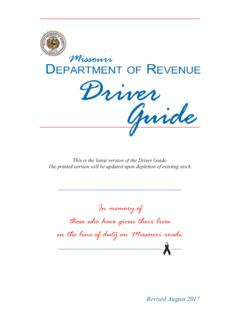Transcription of GCSE (9-1) Business - Edexcel
1 This draft qualification has not yet been accredited by Ofqual. It is published to enable teachers to have early sight of our proposed approach to Pearson Edexcel Level 1/Level 2 GCSE (9 - 1) in Music (1MU0). Further changes may be required and no assurance can be given at this time that the proposed qualification will be made available in its current form, or that it will be accredited in time for first teaching in September 2016 and first award in Edexcel Level 1/Level 2 GCSE (9 - 1) in Business (1BS0)First teaching from September 2017 First certification from 2019 GCSE (9-1)BusinessIssue 1 Contents 1 Introduction 2 Why choose Edexcel GCSE Business ? 2 Supporting you in planning and implementing this qualification 3 Qualification at a glance 4 2 Subject content and assessment information 6 Theme 1: Investigating small Business 7 Theme 2: Building a Business 14 Assessment Objectives 22 3 Administration and general information 23 Entries 23 Access arrangements, reasonable adjustments, special consideration and malpractice 23 Student recruitment and progression 25 Appendix 1: Command word taxonomy and definitions of Business terms 29 Appendix 2: Quantitative skills 31 Appendix 3: Formulae 32 Appendix 4: Calculators 33 Appendix 5: The context for the development of this qualification 34 Appendix 6: Transferable skills 36 Appendix 7: Codes 37 Pearson Edexcel Level 1/Level 2 GCSE (9 1) in Business Specification Issue 1 July 2016 Pearson Education Limited 2016 2 1 Introduction Why choose Edexcel GCSE Business ?
2 We ve listened to feedback from all parts of the Business subject community, including teachers, subject associations, professional bodies and higher education. We ve used this opportunity of curriculum change to redesign a qualification that is engaging and inspiring, and which reflects the demands of a truly modern and evolving Business environment a qualification that enables your students to develop as commercially minded and enterprising individuals and helps them to succeed in their chosen pathway. Developing enterprising minds Familiar course content and approach we ve retained the structure of our current specification while building in new content areas to give you as much continuity as possible, starting the course with an exploration of how and why businesses start, moving through to the issues and decisions businesses make as they grow. Clear and simple structure based on your feedback we ve taken the opportunity to make some improvements to the clarity and structure of our new specification and exam papers to make sure you are clear about the new teaching and assessment requirements from your first glance.
3 Engaging and contemporary contexts our engaging themes will spark your students imagination and inspire commercial thinking as they develop their Business knowledge. W e know you use contemporary Business contexts in your teaching and our new specification will enable you to continue to bring practical and engaging case studies into the classroom. We also know that real and relevant Business examples engage your students so you ll continue to see these in our assessments. Clear and accessible assessment for all our new papers will build confidence through ramped questions which increasingly challenge students as they move through the paper. Our consistent assessment structure and straight forward mark schemes make the expectations clear to teachers and students. Trusted expert support when you need it we ll provide detailed content and assessment guidance as well as course planners, case studies and guides for how to include investigative tasks within the teaching and learning, to help you implement the new specification with confidence.
4 Our Subject Advisor Colin Leith is available to answer your questions and provide guidance and support. Pearson Edexcel Level 1/Level 2 GCSE (9 1 ) in Business Specification Issue 1 July 2016 Pearson Education Limited 2016 3 Supporting you in planning and implementing this qualification Planning Our Getting Started G uide gives you a comprehensive overview of the new GCSE qualification to help you to get to grips with the changes to content and assessment, and to help you understand what these changes mean for you and your students. We will give you editable course planners and a scheme of work that you can adapt to suit your department. Our mapping documents highlight key differences between the new and legacy specifications. Teaching and learning There will be lots of free teaching and learning support to help you deliver the new qualification, including: case studies and activities a guide to using practical examples and Business investigations additional support and guidance for the new content areas.
5 Preparing for exams We will provide a range of resources to help you prepare your students for the assessments, including: specimen papers to support formative assessments and mock exams marked exemplars of student work with examiner commentaries. ResultsPlus ResultsPlus provides the most detailed analysis available of your students exam performance. It can help you identify the topics and skills where further learning would benefit your students. examWizard examWizard is a free online resource for teachers containing a huge bank of past paper questions and support materials to help you create your own mock exams and tests. Get help and support Our subject advisor service, led by Colin Leith, will ensure you receive help and guidance from us. You can sign up to receive e-newsletters from Colin to keep up to date with qualification updates and product and service news. UK: 020 7010 2182 Intl: + 44 (0)20 7010 2182 Learn more at Pearson Edexcel Level 1/Level 2 GCSE (9 1) in Business Specification Issue 1 July 2016 Pearson Education Limited 2016 4 Qualification at a glance Content and assessment overview The Pearson Edexcel Level 1/Level 2 GCSE (9 1) in Business c onsists of two externally-examined papers.
6 Students must complete all assessment in May/June in any single year. Theme 1: Investigating small Business (*Paper code: 1BS0/01) written examination : 1 hour and 30 minutes 50% of the qualification 90 marks Content overview Topic Enterprise and entrepreneurship Topic Spotting a Business opportunity Topic Putting a Business idea into practice Topic Making the Business effective Topic Understanding external influences on Business Assessment overview The paper is divided into three sections: Section A: 35 marks Section B: 30 marks Section C: 25 marks. The paper will consist of calculations, multiple-choice, short-answer and extended-writing questions. Questions in Sections B and C will be based on Business contexts given in the paper. Calculators may be used in the examination . I nformation on the use of calculators during the examinations for this qualification can be found in Appendix 4: Calculators. *See Appendix 7: Codes for a description of this code and all other codes relevant to this qualification.
7 Pearson Edexcel Level 1/Level 2 GCSE (9 1 ) in Business Specification Issue 1 July 2016 Pearson Education Limited 2016 5 Theme 2: Building a Business (Paper code: 1BS0/02) written examination : 1 hour and 30 minutes 50% of the qualification 90 marks Content overview Topic Growing the Business Topic Making marketing decisions Topic Making operational decisions Topic Making financial decisions Topic Making human resource decisions Assessment overview The paper is divided into three sections: Section A: 35 marks Section B: 30 marks Section C: 25 marks. The paper will consist of calculations, multiple-choice, short-answer and extended-writing questions. Questions in Sections B and C will be based on Business contexts given in the paper. Calculators may be used in the examination . I nformation on the use of calculators during the examinations for this qualification can be found in Appendix 4: Calculators. Pearson Edexcel Level 1/Level 2 GCSE (9 1) in Business Specification Issue 1 July 2016 Pearson Education Limited 2016 6 2 Subject content and assessment information Qualification aims and objectives The aims and objectives of this qualification are to enable students to.
8 Know and understand Business concepts, Business terminology, Business objectives, the integrated nature of Business activity and the impact of Business on individuals and wider society apply knowledge and understanding to contemporary Business issues and to different types and sizes of businesses in local, national and global contexts develop as enterprising individuals with the ability to think commercially and creatively to demonstrate Business acumen, and draw on evidence to make informed Business decisions and solve Business problems develop as effective and independent students, and as critical and reflective thinkers with enquiring minds use an enquiring, critical approach to make informed judgements investigate and analyse real Business opportunities and issues to construct well-argued, well- evidenced, balanced and structured arguments, demonstrating their depth and breadth of understanding of Business develop and apply quantitative skills relevant to Business , including using and interpreting data.
9 Business contexts Through studying this qualification students will: apply knowledge and understanding to different Business contexts. These include businesses ranging from small enterprises to large multinationals and businesses operating in local, national and global contexts develop an understanding of how these contexts impact on Business behaviour use Business terminology to identify and explain Business activity apply Business concepts to familiar and unfamiliar contexts. Business decision making Through studying this qualification students will: apply knowledge and understanding to Business decision making, including: o the interdependent nature of Business activity, influences on Business , Business operations, finance, marketing and human resources; and how these interdependencies underpin Business decision making o how different Business contexts affect Business decisions o the use and limitation of quantitative and qualitative data in making Business decisions develop problem-solving and decision-making skills relevant to Business investigate, analyse and evaluate Business opportunities and issues make justified decisions using both qualitative and quantitative data, including its selection, interpretation, analysis and evaluation, and the application of appropriate quantitative skills.
10 Pearson Edexcel Level 1/Level 2 GCSE (9 1 ) in Business Specification Issue 1 July 2016 Pearson Education Limited 2016 7 Theme 1: Investigating small Business Overview Theme 1 concentrates on the key Business concepts, issues and skills involved in starting and running a small Business . It provides a framework for students to explore core concepts through the lens of an entrepreneur setting up a Business . In this theme, students will be introduced to local and national Business contexts and will develop an understanding of how these contexts impact Business behaviour and decisions. Local contexts refer specifically to small businesses or those operating in a single UK location and national contexts relate to businesses operating in more than one location or across the UK. Students must develop an understanding of the interdependent nature of Business activity through interactions between Business operations, finance, marketing and human resources, as well as the relationship between the Business and the environment in which it operates.
